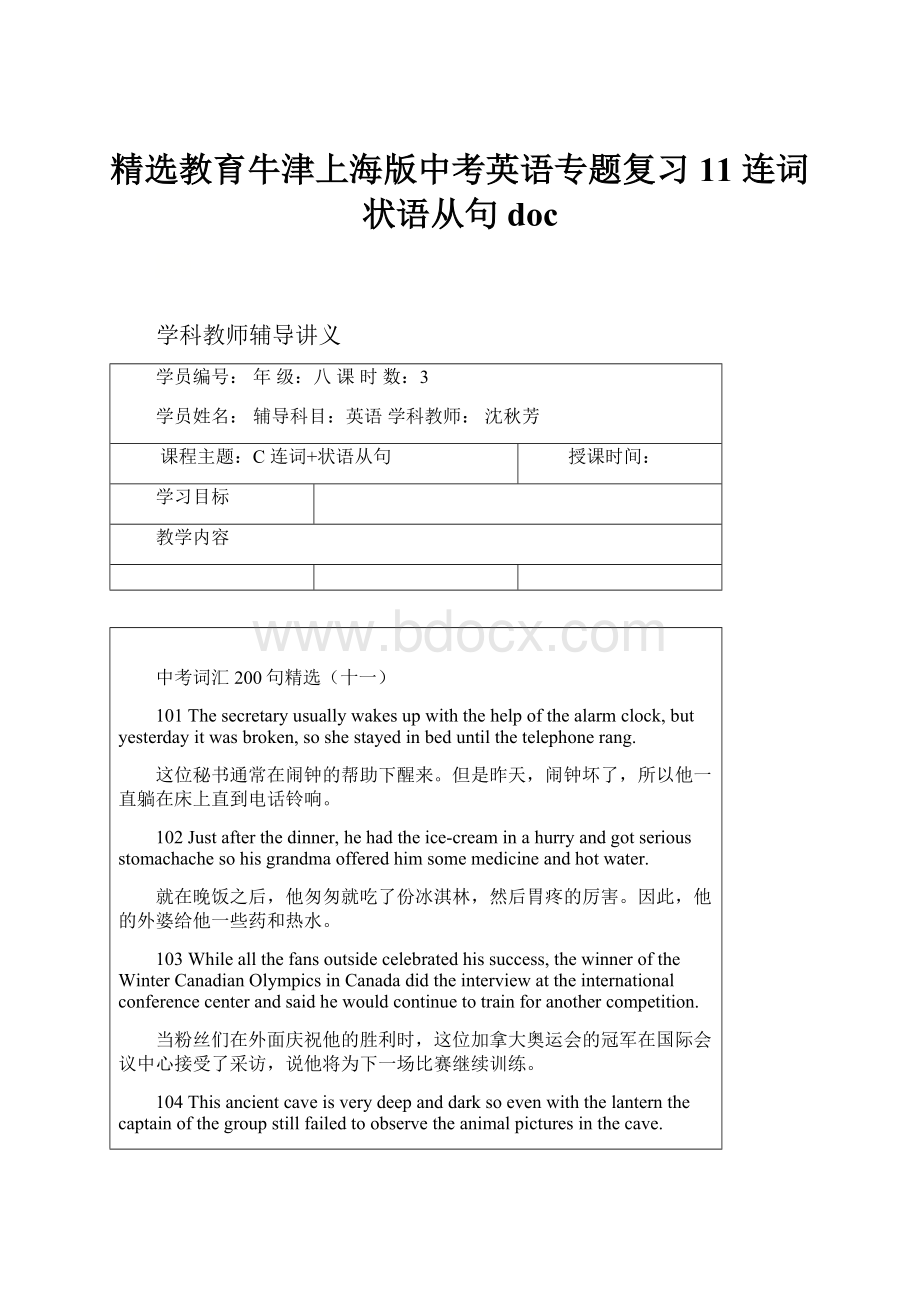精选教育牛津上海版中考英语专题复习11 连词 状语从句doc.docx
《精选教育牛津上海版中考英语专题复习11 连词 状语从句doc.docx》由会员分享,可在线阅读,更多相关《精选教育牛津上海版中考英语专题复习11 连词 状语从句doc.docx(29页珍藏版)》请在冰豆网上搜索。

精选教育牛津上海版中考英语专题复习11连词状语从句doc
学科教师辅导讲义
学员编号:
年级:
八课时数:
3
学员姓名:
辅导科目:
英语学科教师:
沈秋芳
课程主题:
C连词+状语从句
授课时间:
学习目标
教学内容
中考词汇200句精选(十一)
101Thesecretaryusuallywakesupwiththehelpofthealarmclock,butyesterdayitwasbroken,soshestayedinbeduntilthetelephonerang.
这位秘书通常在闹钟的帮助下醒来。
但是昨天,闹钟坏了,所以他一直躺在床上直到电话铃响。
102Justafterthedinner,hehadtheice-creaminahurryandgotseriousstomachachesohisgrandmaofferedhimsomemedicineandhotwater.
就在晚饭之后,他匆匆就吃了份冰淇林,然后胃疼的厉害。
因此,他的外婆给他一些药和热水。
103Whileallthefansoutsidecelebratedhissuccess,thewinneroftheWinterCanadianOlympicsinCanadadidtheinterviewattheinternationalconferencecenterandsaidhewouldcontinuetotrainforanothercompetition.
当粉丝们在外面庆祝他的胜利时,这位加拿大奥运会的冠军在国际会议中心接受了采访,说他将为下一场比赛继续训练。
104Thisancientcaveisverydeepanddarksoevenwiththelanternthecaptainofthegroupstillfailedtoobservetheanimalpicturesinthecave.
这个古老的洞穴既深又黑,所以即使打着灯笼,小组的队长仍无法观察洞穴的动物壁画。
105Thepersonsinthetowdidn'tbelievethetruththatthelakehadbeenpollutedbythenearbychemicalfactoriesuntilthelakewascoveredwiththedeadfish.
直到湖里全是死鱼时,镇里的人们才相信这个事实,即湖泊已经被周围的化工厂污染了。
106Duringthespringfestival,peopleusuallysetofffireworkstosaygoodbyetothepastyearandwelcometheNewYear.
春节期间,人们通常放烟火辞旧迎新。
107DuringtheNationalDay,thewholenationisfilledwithhappyatmosphere,streetsfullofballoonsandredflagsandeveryChinesehopesourmothercountrybecomemoreandmorepowerful.
国庆节期间,整个国家处处都是欢乐的氛围,街道上也处处是气球和红旗。
每一位中国人都希望自己的祖国越来越强大。
108Afterthearmyattackedenemy'sbase,thebattlebrokeoutinthenorthareaandjustafter2hours,theenemygaveupthebase.
部队攻击了敌人的基地。
战斗在北部爆发了仅2小时之后敌人放弃了基地。
109ThisblindAustraliansingerwasverypopularwithteenagersandinyesterday'scharityshow,hesanghisfavoritesongswhilesomeactressesweredancingaroundhim.
这位澳洲盲人歌手在年轻人种很受欢迎。
昨天在一场慈善表演中,他演唱了自己最喜欢的歌曲,同时一些女演员在其周围伴舞。
110Somearticlesandthepicturesofthesemagazinesaboutgeographyandjourneyaren'tprintedclearly,sothissectioncan'tpublishthesemagazines.
这本杂志中有关地理和旅行的一些文章和照片印的不是很清楚,所以该部门无法出版这些杂志。
一、专题知识梳理
1.连词的概念
连词是一种在句子与句子之间,短语之间以及名词等其他词语之间起连接作用的虚词,它不能单独作句子的成份。
按其意义可分为并列连词和从属连词两大类。
并列连词连接的双方是对等的。
2.连词的分类
常有的
1、并列连词:
and,both…and,either…or,neither…nor,notonly…butalso,aswellas等。
2、表转折的并列连词:
but,however,while(而),only(只不过)。
3、表选择的并列连词,or,orelse,otherwise…
4、表因果的连词:
for,so,therefore(因此),then等。
5、从属连词:
that,if,whether,(初中主要用来连接宾语从句,其次用来连接状语从句。
)
6、时间状语从句,常用的连接词有:
whenwhile,as,since,before,after,once,assoonas,until,till
7、连接条件状语的连词有:
if,unless,aslongas等,
8、而原因状语的连接词有because,since,as,nowthat(既然)。
9、目的、结果、方式、比较、地点等状语从句的连接词有:
sothat,so…that,such…that,as…as,than,where…
它们在句子与文章中几乎无处不见。
我们通过一些例句来分析一下连词的功用。
3.重点连词辨析
1、because、as、since、for的用法:
because表示原因的语气最强,常表示必然的因果关系,从句一般放在主句后面;另外,回答why的问句只能用because.
as表示一般的因果关系,语气比because弱,说明比较明显的原因,它引导的从句可以放在句首也可以放在句尾。
since(既然)表示对方已经知道、无需加以说明的原因或事实。
for(因为)是并列连词,语气较弱,用来补充说明理由或提供一种解释。
如:
Heisnotatschooltodaybecauseheisseriouslyill./Asallofyouhavegothere,now,let’sgotothezoo./IwillaskLinTaotogowithmesinceyouareverybusy./Wemustbeoffnowforthematchstartsat7:
00.
2、if、whether的区别:
表示“是否”时,if和whether同义,引导宾语从句,另外,whether还可以引导主语从句、表语从句(以及同位语从句)等名词性从句或者让步状语从句;而if还可以表示“如果”,引导条件状语从句,(主句与从句遵循主将从现的原则)。
如:
Idon’tknowif/whetherhewillarriveontime.(我不知道他是不是会按时到达)/Iwillringyouupifhearrivesontime.(如果他按时到达我会给你打电话的)
下列情况只能用whether不能用if:
引导主语从句,如:
WhetheritisafinedaynextSundayisstillaquestion.
②引导从句作介词宾语
③引导不定式短语,/Pleaseaskhimwhethertogotherewitharaincoatornot.(作动词的宾语)/
④引导让步状语从句,Hainanistheplacetobe,whetherit’ssummerorwinter.(引导让步状语从句)/
⑤在动词discuss之后
⑥在wonder/notsure之后
【讲解】给学生讲的时候,不必让其记住这些情况,简单地告诉学生,能用whether就用whether,if和whether在一起,都表示“是否”的时候,用whether肯定没错,因为whether更“专业”。
3、while、when、as的用法区别:
1)while常表示一个较长的动作,它引导的从句动作与主句的动作是同时发生的、是平行的;
PleasedonottroublemewhileIamwritingmyhomework./
2)when可以表示较短的动作也可以表示较长的动作,主句和从句的动作可以同时发生也可以先后发生;
I’llgohomewhenIhavefinishedmyjob./Theywererunningquicklyacrosstheroadwhentheyheardthesoundofatruckcoming
3)as与上两词同义,可替换while和when,表示主句和从句的动作同时发生,常译为“一边……一边……”。
.
Aswewalkedinthedarkstreet,wesangsongsandtalkedloudly.
4、till/until与not…till/until的区别:
1)前者表示一个延续性的动作,后者表示一个才开始的动作。
如:
Iwillstayhereandwatchthebabyuntilyoureturn.(stay这个动作一直进行到你return)/
2)Theywon’tgoonworkinguntiltheygetwhattheythinkisreasonable.
另外till与until基本可以互换,但是在句首时只能用until,不能用till.
如:
Untilthelastminuteofthematchwekeptplaying.
Notuntilhehadfinishedhisworkdidhegohome.(倒装句)
5、though与although的区别:
两个词都表示“虽然”,均不可以与but同时使用,但在句中可加still或yet连用。
although“尽管、虽然”仅作连词,比较正式,一般可以换为though;though“虽然、尽管、即使”,还可以与even连用(=evenif),表示“即使、纵然”,作副词时意思是“然而、不过”,不能放在句首。
如:
Hepassedtheexamsalthoughillnesspreventedhimfromgoingtoclasses./shewon’tleavetheTVset,eventhoughherhusbandiswaitingforherforthesupper./Itwasaquietparty.Ihadagoodtime,though.
6、preferto…ratherthan…与prefer…to…的区别:
preferto…ratherthan…后面都是用动词原形,prefer…to…都是用动名词或名词。
如:
IpreferEnglishtoJapanese./IprefertolearnEnglishratherthanlearnJapanese.
二、专题精讲
1、___shewasnotwell,Idecidedtogowithouther.
A.ThoughB.AsC.WhenD.Becauseof
[答案]B.
[讲解]as这里应译为"由于"。
全句意为:
由于她不舒服,我决定不带她去了。
而becauseof其后不能接从句只能接宾语。
如:
Becauseoftheheavyrain,wedecidednottogo。
2、Takethisdictionarywithyou___youmayuseitinclass.
A.otherwiseB.inordertoC.orD.sothat
[答案]D.
[讲解]应译为"为的是"。
本句句义为:
带上字典,为的是在上课时可能有用。
而inorderto其后应接动词不定式,如:
Takethisdictionarywithyouinordertouseitinclass。
3、—Idon’tknow______Ishoulddowithsomanyeggs.–Youcansellthem.
AhowBwhyCwhatDwhen
[答案]A.
[讲解]can表示能,可以,你可以卖掉他们,如果我们对“卖掉”进行提问的话,是什么?
是方式,所以用how。
三、专题过关
1.Domoreexerciseeveryday,you’llbestrongerthanbefore.
A.soB.butC.andD.or
2.IhavesomethingimportanttodiscusswithTim.IwillwaitforTimhegetsback.
A.asB.untilC.whenD.after
3.Youcanbuycomputersatalocalshop.They’reusuallymoreexpensive,______youcangetbetterafter-salesservice.
A.andB.butC.soD.or
4.Arthur,youwillgettoothache______youcleanyourteethregularly.
A.unlessB.sinceC.ifD.before
5.WewillgotoHappyValleytomorrowitrains.
A.untilB.whenC.unlessD.if
6.theWorldExpowasover,alotofvisitorsstillgototheChinaPaviliontoenjoythemselvesandtakephotos.
A.AlthoughB.SinceC.WhenD.As
7.Don'tstayuptoolate.________you'llfindithardtogetupontimetomorrow.
A.orB.butC.andD.so
8.Susandidquitewellinthefinalexam________shehadmissedtwoweeks'lessons.
A.thoughB.ifC.becauseD.unless
9.Idecidednottobuyfrozendumplingsthegovernmentsaidtheyweresafe.
A.becauseB.thoughC.sinceD.or
10.Ican’tunderstandthesentence____therearenonewwordsinit.
A.ifB.untilC.thoughD.because
11.Wewillrememberthepicture______itissilly,strangeandcolorful.
A.unlessB.ifC.beforeD.after
12.Speaklouder_______everyoneinthemeetingroomcanhearyouclearly.
A.sothatB.inordertoC.sinceD.because
答案:
1-5CBBAC6-10AAABC11-12BA
4、学法提炼
1熟悉各个连词的使用方法。
2在理解句意的基础上选择合适的连词。
3注意区别相近意义的连词。
一、专题知识梳理
一、状语从句的概念
用来修饰主句中的动词,副词和形容词的从句叫状语从句。
二、状语从句的分类
根据其含义状语从句可分为时间状语从句,地点状语从句,条件状语从句,原因状语从句,结果状语从句,比较状语从句,目的状语从句,让步状语从句。
三、状语从句的句法功能
1.时间状语从句(主句将来时从句现在时)
1)时间状语从句常用when,as,while,before,after,since,till,until,assoonas等连词来引导。
例如:
Itwasraininghardwhengottoschoolyesterday.
Whilehewasdoinghishomework,thetelephonerang.
Ashewalkedalongthelake,hesanghappily.
HehadlearnedalittleChinesebeforehecametoChina.
Afterhefinishedmiddleschool,hewenttoworkinafactory.
易混引导词while,when的区别:
when既可以指"时间点",与瞬间动词连用,也可以指"时间段",与延续性动词连用(=while)。
While表示时间段,因此,while从句的谓语动词要用延续性动词。
练习:
用while或when填空
1.Pleasedon'ttalksoloud______othersareworking.
2.______hecamein,hismotherwascooking.
3.______wewereatschool,wewenttothelibraryeveryday.
Keys:
1.while2.when2.While
2)在时间状语从句里,通常不用将来时态,用现在时态表示将来的动作或状态。
练习:
1.I’llringyouupassoonasI______(get)toNewYork.
2.Iwilltellhimeverythingwhenhe______(come)back.
3.Hewon’tbelieveituntilhe______(see)itwithhisowneyes.
Keys:
1.get2.comes3.sees
结论:
主将从现的原则
3)在带有till或until引导的时间状语从句的主从复合句里,如果主句用肯定式,其含义是“一直到……时”,谓语动词只能用延续性动词。
如果主句用否定式,其含义是“直到……才……”,“在……以前不……”,谓语动词可用瞬间动词。
例如:
(注意粗体单词)
1.Theyoungmanreadtillthelightwentout.
2.Let’swaituntiltherainstops.
3.Wewon’tstartuntilBobcomes.
4.Don’tgetoffuntilthebusstops.
2.条件状语从句(主句用将来时从句用现在时)
1)条件状语从句通常由if,unless引导。
例如:
Whatshallwedoifitsnowstomorrow?
Don’tleavethebuildingunlessItellyouto.
2)在条件状语从句里,谓语动词通常用现在时态表示将来的动作或状态。
练习:
1.I’llhelpyouwithyourEnglishifI______(be)freetomorrow.
2.He______(not)belateunlessheisill.
Keys:
1.am2.willnot
3)“祈使句+and(or)+陈述句”在意思上相当于一个带有条件状语从句的复合句。
例如:
Hurryup,or(其中文意思是什么)you’llbelate.
=Ifyoudon’thurryup,you’llbelate.
Studyhardandyouwillpasstheexam.
=Ifyoustudyhard,youwillpasstheexam.
批注:
需要让学生理解祈使句也是个句子,只是省略主语的句子,汉语中也较多此类句型,可以类比讲解。
3.原因状语从句
1)原因状语从句通常由because,since(因为),as(因为)引导。
例如:
Hedidn’tcometoschoolbecausehewasill.
Asitisraining,weshallnotgothezoo.
Sinceyoucan’tanswerthequestion,I’llasksomeoneelse.
2)because表示直接原因,语气最强。
Because引导的原因状语从句多放在主句之后。
回答由why提出的问题,只能用because。
As和since语气较弱,一般用来表示明显的原因。
由as和since引导的原因状语从居多放在句首。
例如:
------Whyaren’tgoingthere